[NOTE: Read the comments below this article for thoughts and perspectives from readers that attended the hearing.]
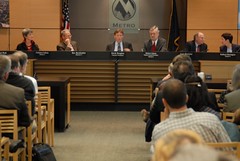
an important hearing on the CRC project.
(Photos © J. Maus)
A packed crowd has assembled at Metro Headquarters in northeast Portland for a public hearing on the Columbia River Crossing project.
Over 60 people have signed up to speak and extra chairs have been brought out to accommodate everyone. Faces in the crowd include Coalition for Livable Future’s Jill Fugilister, notable critic of the project Ron Buel (he’s the guy that wants to bury the I-5 freeway), veteran transportation activist Jim Howell (he played a role in the defeat of the Mt. Hood Freeway), former City Council candidate Chris Smith, and others.
On the agenda are several resolutions that will help shape Metro’s position on the controversial, $4.2 billion project. But before any vote can happen, the Council has to listen to well over 60 people that have signed up to share their views (it’s going to be a very long meeting — the first break isn’t scheduled until 5:00).
Rex Burkholder introduced the issue, giving us a history of the project, listing the problems the project hopes to solve (the usual litany of congestion, safety, lack of transit, etc…) and re-iterating his support for the process thus far. Burkholder — Metro’s representative on the 39-member CRC Task Force — reminded the crowd that they were assembled today not to vote on a Locally Preferred Alternative, but, “what we’re voting on today is… to give me direction on what this body [Metro Council] believes is the most effective solution to those problems.”
First to speak up was Oregon Department of Transportation director Matt Garrett. Garrett, in his usual bureaucratic style, talked glowingly about how the CRC is about partnerships and opportunities, and that “if we don’t take advantage of the partnerships we’ll never grasp the opportunities.”
Once he was finished, Metro Councilor Robert Liberty — an outspoken critic of the project — asked Garrett about how the project will be funded, saying, “Given the demands on [funding] resources, it’s going to be pressing on my mind where those funds will come from.” Garrett admitted that the funding picture is not clear yet, but that he believes, “it is important that we turn on as many financial spigots as possible for this project… that’s how important I think this is.”
The first few speakers included the director of the Portland Expo Center who has concerns about how proposed interchange redesigns might impact their business.
Swan Island transportation expert and critic of the project Lenny Anderson, said he supports the three Metro Councilors who proposed a resolution calling for implementing tolls on the existing bridge before moving forward. Anderson added that ODOT’s Garrett routinely “overstates the need and understates the impact” of the project.
Pointing out that the the proposal in the works “doubles the number of lanes for auto traffic” on the bridge, Anderson said, “I do not want us to be remembered for putting forth a project with the largest vehicle capacity increase in decades… that’s not a legacy we can be proud of.”
Chris Smith, a transportation activist who just wrapped up a run at Portland City Council, opened his testimony by saying, “Often the answer you get depends on how you ask the question.” Smith said asking how to relieve congestion is important, but that there are other important questions we should ask, such as: “Should we look at tolling as the primary question and then base how we go forward from that? What does this project do to land-use in our region? What does this project mean in a post peak-oil world?”
Smith’s most memorable question was, “At what price of oil does this project stop making sense?” He ended his testimony with, “I am deeply concerned that none of the options before us represent the best choice for our region.”
A representative from Schnitzer Steel spoke in support of the project (favoring a replacement bridge with light rail.). He said the project was important to area shippers and that his company takes 900 truckloads per month and 45 trucks per day over the existing spans. “Time delays on the bridge [due to congestion],” he said, “have a direct and tangible impact on our bottom line.”
I’m going to head back into Council Chambers and see what’s going on (there’s no wi-fi from inside, so I might try posting from my phone).
_____________
UPDATES:
— It’s confusing to follow all the twists and turns in this process and especially here at Metro, where several resolutions and myriad amendments are on the table (literally, on a table as you walk in). I want to try and clarify a few things. First, the resolution in opposition to the project put forth by Councilors Liberty, Hosticka, and Collette does not have a fourth vote and is not expected to move forward.
Council President David Bragdon has an interesting resolution on the table. It recognizes that Metro will instruct its “delegate” (Rex Burkholder) to endorse the replacement bridge, light rail and tolls as specified in the Draft EIS. But it goes on to say that “Metro Council simultaneously finds that the following issues will need to be satisfactorily addressed in the upcoming refinement of design, engineering and financial planning.”
The Bragdon resolution goes on to say that:
“The Governors of the two states are respectfully requested to convene a Local Oversight Committee consisting of the following local agencies to make all major planning, design, engineering, finance and construction decisions in partnership with the two state governments.”
The “local agencies” that would make up this committee are the cities of Vancouver and Portland, the Metro Council, the Regional Transportation Council (Washington’s version of Metro), and C-Tran and TriMet (the Vancouver and Portland mass transit authorities.)
The decisions to be made by this six-party committee would “include but would not be limited to”:
-
— Number of total lanes
— Size and design of the bicycle and pedestrian facilities
— Design of the light rail transit facility
This is essentially an attempt to remove the Washington and Oregon Departments of Transportation from having such major influence over many aspects of the project (which explains while ODOT director Matt Garrett is still here after 90% of the crowd has left).
===
— I had to leave the hearing at about 6:45 while the Council was debating and discussing the various amendments. Here is a final update from reader John Reinhold who stayed until the end:
“Metro voted to recommend a new bridge, with a few ammendments which ask for some better numbers and details than we have been given thus far.
The vote was 5 to 2 in favor. 3938B passed with amendments.
This is only a vote to provide guidance for Rex Burkhokder when he goes back to the CRC task force to work on selecting the Locally Preferred Alternative (LPA).
This action does not actually officially approve any bridge option.
The actual votes on the LPA [locally preferred alternative] will be later this summer. Those are the actual votes with teeth.
However, this can be an indicator that expensive bridge opponents have a hard fight ahead. The CRC is a battleship that may not be able to reverse its course.”
That’s it for tonight, I might do a wrap-up story with some added thoughts and photos tomorrow.



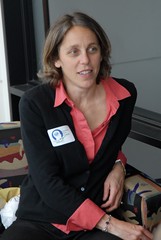
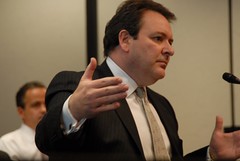
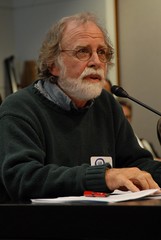
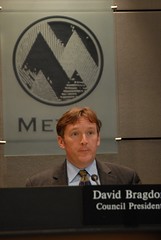
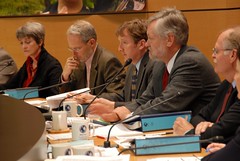

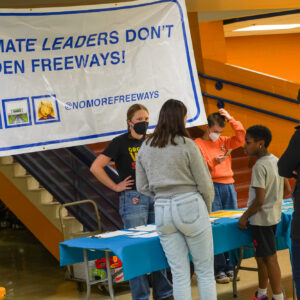
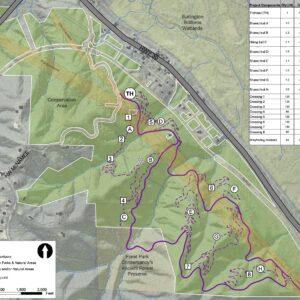
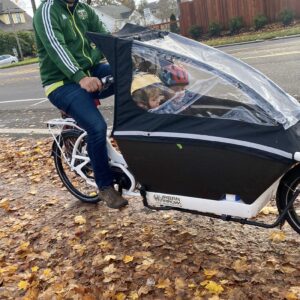
Thanks for reading.
BikePortland has served this community with independent community journalism since 2005. We rely on subscriptions from readers like you to survive. Your financial support is vital in keeping this valuable resource alive and well.
Please subscribe today to strengthen and expand our work.
Jonathan,
Thank you so much for being our eyes and ears and keeping us all informed in such a timely manner.
Keep up the amazing work!!
Thanks for the real time coverage Jonathan. I am sure there are many of us wanting to to be there.
Jim
Indeed, thanks for the coverage…keep it coming!
It\’s unfortunate that a man as brilliant as Chris Smith wasn\’t able to become one of our city council members this time around. All of his points seem to hit the shortcomings of the CRC project right in the head.
Also, it\’s spigots, not spickets.
6:30pm and public testimony has been done for a while. Currently Metro councillors are working on the resolutions at hand. There are many ammendments being proposed, and they are debating each one.
So far most of the ammendments have been requiring of the project commitments to reduce VMT, reduce global warming emissions, and minimize environmental and livability impacts to residents in the corridor.
Thus far there has been broad support for the ammendments strengthening our commitments as a region to environmental progress.
There has also been broad support to have independent analysts of the CRC task force\’s assumptions, assertions, and numbers.
We are onto our fourth ammendment and associated debate.
So far it appears that Councillor Rod Park, district 1, has been the most in favor of the CRC progect as ir currently stands and most in opposition to adding more teeth to Metro\’s CRC recomendations.
There are many ammendments to keep track of, but that is the general gist of what is going on.
I wanted to add that now (at 7pm) there are less than 30 people in the gallery, and most of them I recognize as CRC staff or Metro staff…
Much of the excitement has waned…
Metro voted to recommend a new bridge, with a few ammendments which ask for some better numbers and details than we have been given thus far.
The vote was 5 to 2 in favor. 3938B passed with ammendments.
This is only a vote to provide guidance for Rex Burkhokder when he goes back to the CRC task force to work on selecting the Locally Preferred Alternative (LPA).
This action does not actually oficially approve any bridge option.
The actual votes on the LPA will be later this summer. Those are the actual votes with teeth.
However, this can be an indicator that expensive bridge opponents have a hard fight ahead. The CRC is a battleship that may not be able to reverse its course.
thanks for those updates John.. i had to leave at about 6:45 to check out another event… i\’ll use your comments to help with some updates on the story.
wow… tag team reporting… I like it. Thanks Jon and John. Great job!
Thanks for the reports John and Jonathan. I do, however, questions this \”So far most of the ammendments have been requiring of the project commitments to reduce VMT.\” How is building a 12-lane mega-bridge supposed to reduce VMT?!?!?!? I\’d think keeping the current bridge and building a transit/pedestrian/cyclist oriented bridge would be the true way to reduce VMT . . .
A big thanks, J and J.
Mara Gross from CLF here. I made it almost to the end, and according to my notes from last night, amendments to 3938B that passed:
Environmental Justice: recommends mitigation for adverse health impacts, and a community enhancement fund similar to the one created as part of the I-5 Delta Park Project (passed 7-0)
Global Warming Commission Consultation: requests the Oregon Global Warming Commission and/or the Washington Climate Action Team to advise regarding whether any alternatives, including those considered at an earlier phase or aspects of the project, would help achieve or frustrate greenhouse gas goals (7-0)
Greenhouse Gas Emissions: Requires an independent analysis of GHG, and supports a commitment to reduce vehicle miles traveled to support OR and WA GHG reduction goals. (7-0; a suggested amendment to strike the phrase focusing on VMT lost 3-4)
Early Implementation of Tolling:
tolls should be imposed as soon as legally and practicably permissible (6-1)
And going back to 3938B, it also requires:
Financing Plan: requires a detailed financing plan that includes federal, state and local expenditures, and how they impact or compare to funds required for other potential expenditures in the region
Capacity Considerations, Induced Demand and Greenhouse Gases: requires an independent analysis of induced demand and GHG
Some things proposed and rejected:
Keep Options Open Amendment: removed language stating that replacement bridge performs better (2-5)
Transportation and Land Use Policies: Metro must comply with Metro\’s Regional Framework Plan and any statewide goals Metro must comply with before amending the RTP regarding the CRC (3-4) ps. Metro\’s lawyer said this is existing law, and a political question whether to include it in the resolution
Regional Transportation Planning Measures: consider RTP Performance Measures, Financial Forecast and Scenarios (1-6)
Congestion Relief Cost Comparison: compare the cost, by hour and value of congestion relief, of CRC proposals and other large highway projects under consideration, including Hwy 217, I-205 widening, and I-5/99W connector (2-5)
Low Income Tolling: consideration of how to address disparate impact of tolls on low income people (2-5)
Thanks for coverage Jonathan.
There will be an LPA — locally preferred alternative?
Doesn\’t that necessarily mean the current design represents outside interests?
Thanks Mara for the low-down on what came out of the hearing. While I am disappointed that the council rejected the \”keep options open\” amendment, I am pleased to see the council endorse \”early implementation of tolling\” by a wide margin. I was actually surprised that short-term tolling is not explicitly included in the BTA\’s recommendations, since it seems a critical first step if we are serious about reducing congestion (and VMT, GHG, and SOVs), and shift the mode split towards mass transit and bikes.
A few things that stuck with me after the meeting:
– The concept of \”induced demand,\” which I\’ve always thought of as \”if you build it they will come.\” I heard on the radio show Think Out Loud recently a guest say something about there being hundreds of acres of farmland in Clark County just waiting to be turned into subdivisions – I could see many projects like that hinging on whether this bridge gets built.
(In general, I got much more the sense of there being Washingtonians wanting easier access to Portland, instead of the reverse.)
– Someone made a point I\’d never considered: if you open up the flow of traffic on the crossing, and increase traffic with all that induced demand, where does all that newly free-flowing traffic go? It dumps into downtown Portland and Vancouver, places that are no more equipped to handle lots more cars than is the current I-5 bridge.
– The gentleman who made the previous point also had some creative suggestions for getting people to car pool and such (involving traffic cameras scanning for 1-passenger cars and such), and while a little far-fetched, I appreciated his attempts to think of ways to reduce car traffic – a notion that seemed foreign to most of the crowd. To the point that many in the audience – and one councilman, Rod Park – were laughing at him. Kinda ticked me off.
– Industry – shipping, real estate, tourism – was well-represented, but to me they seemed to be reading from the same playbook. Literally – they tended to be the ones reading aloud from prepared statements. And their comments had, I thought, a distinct consistency: they called it the Replacement Bridge with Light Rail, they made sure to mention the bike and pedestrian lanes, and pointed out that idling while stuck in traffic produces lots of greenhouse gases. I just had the feeling they\’d all received the same email with the talking points.
– Someone made the point that a few decades ago one of the two current bridges had closed, and people dealt with it. That I did not know.
– A bicyclist pointed out that the $4 billion bridge, while equipped with a bike lane, will be a mountain to cross. Also that cyclists will have to take an elevator to Hayden Island, and how will bikes with trailers deal with that? (Which reminds me, there were residents of Hayden Island complaining how hard it is to get on and off the island. And I just kept thinking, well you live on an *island*.)
I would love to find a transcript of the proceedings – I did notice a clerk taking notes.
Fascinating account, as I was only able to attend from 2:00 to about 4:30. As a Clark County resident and commuter bicyclist, I\’ve been pro-bridge, and very concerned with where the \”Metro 3\” were headed. However, after attending the meetings in person, I came away with the sense of public officials trying to do the right thing with such a huge project.
I thought the CLF, in particular, brought up some very valid points that need to be addressed, especially in the areas of community impact. If Metro is going to step up and be the guarantor of those commitments, than more power to them.
Graham is absolutely right that the parade of industry lobbyist types are all working off the same page. I\’m still pro-bridge, but the more industry types that are out front and center on this, it actually works to their detriment.
As to the \”mountain to cross\” for bicyclists, my understanding is that we\’d be looking at a 3 1/2 % grade, whereas the current I-5 bridge is a 5% grade at it\’s peak. I\’m no bridge engineer and really need to look that up.
hawt damn, how does chris smith just keep getting sexier?
i shared this article with a few politically active friends who were under the impression that it is already a \”done deal\”. Jonathan, after reading your article I think they have changed their mind. Thanks!
#1) this is a big deal, i mean A REALLY BIG DEAL
#2) a lot of people understand #1
#3) the more #2s we have the harder it is to build a crappy bridge
One of the frustrating things about this whole deal is that when we raise issues or questions during basic opposition of the project, we tend to get branded as anti-bridge or anti-Vancouver.
Which is not the case. What I believe most of us oppose is the CRC project as it has been presented. We oppose a 4 to 6 billion dollar mega-bridge. We oppose the all-or-nothing approach which has been rammed down our throats. We oppose the lack of alternatives.
I support finding a solution to the I5 crossing problems. I simply believe that we have more than 5 options that we should be looking at. I believe that we could improve the crossing in the short term a lot by implementing a combination of smaller and cheaper alternatives. I believe that we need to work in the paradigms of the future, not the past.
What I oppose is the current CRC project. The current all-or-nothing CRC approach.